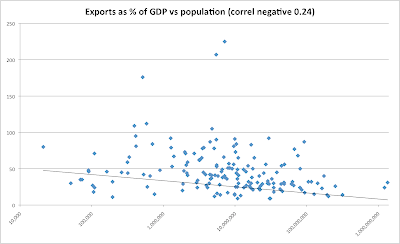A throwaway phrase which many people use is that "Great Britain is a great trading nation", but on closer inspection, how true is this any more?
I downloaded all available figures for populations and GDP from the CIA Factbook and exports-to-GDp ratios from the World Bank (that last one is hours of fun), bunged them into Excel and created some charts.
All horizontal axes are logarithmic. The coefficient of correlation for exports-to-GDP is negative 0.13 if you use absolute figures and positive 0.04 if you use logarithms, so to all intents and purposes, this is zero.
Unsurprisingly, there is a slight negative correlation between population size and exports - if you have a large population then there will be a much wider range of producers and consumers in the same country, but if you have a smaller population, you tend to specialise in fewer things, so if you are world leader in bananas or oil or anything else, you have to export most of your output to be able to buy stuff which other people produce cheaper or better than you.
Similarly, there is a fairly high positive correlation between per capita income and exports - the richest people/countries are those who specialise, which in turn drives exports; and people/countries who export more are probably richer (chicken and egg).
And how does the UK score?
It's only fair to compare like-with-like, so I sorted the data three ways, in terms of descending population; per capita income; and GDP, and then compared the UK's exports with the next three countries above and below it in the rankings. The UK scored distant fourth, distant fifth and distant second equal respectively. Which hardly makes us a "great trading nation" any more.
The figures for the six countries with exports-to-GDP ratios over 100% are misleading as they include a lot of purely paper exports which are matched by equal and opposite paper imports, i.e. trades are booked through those usually small countries for tax, regulatory or subsidy reasons (lack of the first two and/or lots of the last) without anything physically actually happening there, i.e. the factory in PR China ships the goods direct from mainland China to elsewhere in the world but the Hong Kong intermediaries book it as a purchase and sale. These six countries are Hong Kong 'Special Administrative Region', Singapore, Luxembourg, Macao 'Special Administrative Region', The Maldives and Republic of Ireland.
So now we know.


It Shouldn't Be A Competitive Sport!
22 minutes ago



0 comments:
Post a Comment